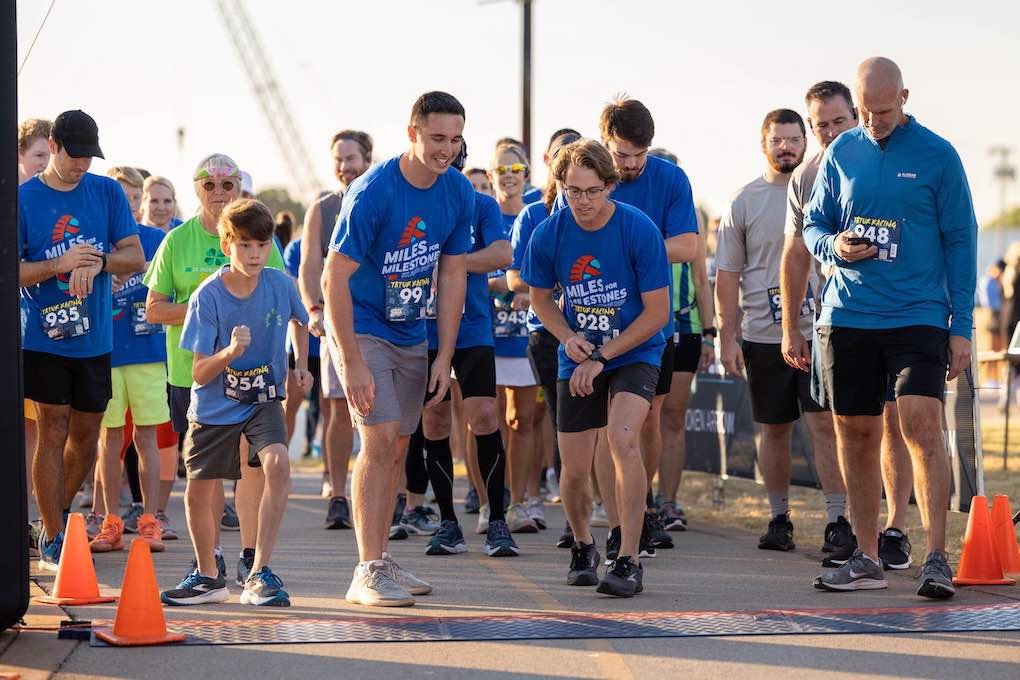My very first 10K run took over 1h20m. Today is the shortest distance of my training week, and my personal best is under 44 minutes. I decreased my personal best almost twice over a while, which is excellent. However, is it a good time to run 10k for my age? Where does my 10k time stand among my peers?
CRUCIAL TAKEAWAYS:
The average time it takes to run 10k is 1:02:11, regardless of age, gender, and running experience.
In this article, we'll analyze data from the five biggest 10k races in the US to define the following:
- How long should it take to run 10k for a healthy person?
- Average 10k times by age and gender
- How long does it take a beginner to run 10k?
- Good 10k times for intermediate runners
- Average 10k times for professional athletes
- Current world records for 10k
- How to predict your 10K finish time?
- Factors Affecting 10k Time
- Training to bet the average 10k time
Healthy Person’s 10k Time
It takes from 1h 08min to 1h 20min for a healthy person to run 10k. This result will make a runner with limited running experience and little preparation finish the race in the top 75% of finishers of a typical average-size running event. It equals 11:00-12:45 min/mile pace or 4.7-5.5 mph speed on a treadmill. It is an excellent starting point to train for the average 10k time of your qualification group.
At the end of the race, finishers get Custom Running Medals that they can later engrave the finish time on.
Average 10k Times by Age and Gender
In the table below, you can find the average 10k times for your age and gender, making you finish the race right in the middle of your group.
These are good 10k times that require a high overall physical fitness level and proper training.
How Long Does it Take a Beginner to Run 10k?
A beginner's average time to run 10k is around 57:00 and 1:07:00. This result will make you finish with the top 50% of fastest finishers of a typical public running event. It corresponds to a 9:10-10:45 min per mile pace and 6.5-5.5 mph speed on a treadmill.
Good 10k Times for Intermediate Runners
It takes about 44:00-57:00 for an intermediate runner to run 10k. You'll finish in the top 20% of racers in a crowded running event. You should run at 7:05-9:10 min/mile pace or 6.5-8.5 mph speed to achieve this. It is a good result for a jogger in good shape with several years of running background.
Average 10k Times for Professional Athletes
The average 10k time for a professional runner is 35:00-44:00. They will finish the race within the best 10% of runners of an average running event. The respective pace is 5:38-7:05 min/mile, and the speed on a treadmill is 8.5-10.5 mph.
With this 10k time, you will compete for the top position among runners of your age and gender. If you can run this fast, you're a seasoned veteran of the 10k circuit and have been improving your 10k time for years.
Effective World Records for 10k
The world record for men's 10k is 26:24, set by 21-year-old Rhonex Kipruto from Kenya on January 12, 2020, in Valencia (Spain).
The current world record for women's 10k is 29:14, set by Yalemzerf Yehualaw from Ethiopia on February 27, 2022, in Castellón (Spain).
Source: worldathletics.org/records/by-category/world-records
The difference between 10k and 10,000 meters runs is that the latter happens on a standard-sized round track (25 laps). At the same time, the former is a road race.
The average time it takes an elite runner to run 10k is under 35 minutes. The respective pace is 5:35 min per mile, and the speed is 10.8 mph. This 10k time allows competing for a podium, prizes, and a course record in a typical public running event.
How to Predict Your 10K Finish Time?
There are two ways to estimate your 10k time:
- Using the 10k pace chart + your desirable pace
- Using the relative effort table + your past 5k/3.1-mile race performance
The former is better for the runners aiming to improve their 10k time, and the latter is better for predicting a reasonable time for your first 10k race. Let's expand on each one of them.
10k pace chart + your desirable pace
If you are sure about the pace, you can keep it for 6 miles, go to the table below and find out your estimated 10k finishing time.
It works the opposite way, too. If you have a target time in mind, find the necessary distance pace on the table and train for it.
The mile splits from the right columns ensure you are pacing well in the middle of the run.
Relative effort table + your past 5k/3.1-mile run
The relative effort table is based on the finish time of thousands of athletes of different experience levels. The more you practice and improve your physical fitness, the lower you can go on the table.
You can't predict your 10k time by multiplying your 5k time by two, as one 10k run is much more complicated than two 5k runs. The table below considers this difference and is more precise in predicting your actual 10k time.
To use the table, run a 3.1-mile at your best effort a few weeks ahead of your 10k run. Find the closest time to your 5k result from the first column and check your estimated 10k finishing time in the second column.
Please note, the table is based on average times for different athletes with different backgrounds and capabilities and can be less precise in your particular case. Sometimes it helps to lower your expectation and go for the 10k time from the row, preseeding your 5k time.
Factors Affecting 10k Time
Many factors influence your 10k time; the major ones are the following.
Physical fitness level. Your fitness level plays the most critical role in determining your 10k time. Don't expect to break records if you don't live a healthy lifestyle and do regular sports. But don't worry, 10k is the distance anyone can run, and with dedication and hard work, you can improve your fitness and, in turn, your 10k time.
Preparation. By failing to prepare, you are preparing to fail. Consistency is vital when it comes to training for a 10k. Skipping runs and not following a proper training plan will make your race a struggle. Stick to the program, and you'll cross the finish with excitement.
Weather conditions. Hot, humid, and windy weather slows you down, while cooler temperatures can boost you. Lower your targeted pace and time if the external conditions aren't beneficial. If you don't do this upfront and intentionally, your body will force you to on the last miles right before the finish line.
The terrain of the race. Hilly terrain can make a 10k feel like a never-ending obstacle course, but a flat course can make for a speedy race. The landscape of the race makes a significant difference in your performance and the effort required. Adjust your target pace and time accordingly, or train hills to neglect the terrain impact.
Training For a 10k
Training is crucial for a successful 10k race. A proper exercise regimen helps build endurance, increase speed, and eliminate injuries.
Building endurance. Your perfect 10k performance needs a solid endurance foundation. Building endurance takes time and effort. To meet the average 10k time, you must log at least 10 miles weekly for half a year or more.
Incorporating speed work. Speed work is the necessary stress for our bodies to progress with running. But don't overdo it. Too much pressure brings fatigue and injuries. To run faster and make the race feel like a breeze, plan only one tempo run, fartlek, or interval training a week. It's enough loading for progress, even for professionals, and not enough for an injury.
Proper nutrition and recovery. Training is essential, but so is fueling and recovering your body. Eating a balanced diet and getting enough sleep and rest will ensure you run on all cylinders in your 10k race. Stretching after training and on a rest day will boost your recovery.
Consistent training. A good training schedule is like a blueprint of your perfect 10k time. It will guide you to your destination and avoid hidden pitfalls on your journey. Without one, you are likely to quit after 2-3 months, when the excitement of your goal will dissolve in routine work without noticeable progress. So, create a reasonable schedule and stick to it. Finding a coach or running buddy helps make it to the end too.
Final Thoughts
Setting a realistic time goal for your 10k race is vital for mental and physical preparation. Running 10k within the average time for your age group right from the couch is impossible.
Proper training and pacing are essential for achieving a personal best 10k time. With dedication, hard work, and the right strategies, you can achieve your goals and reach the finish line feeling proud of your accomplishment.
Good luck!
This article is a part of our “Average Running Time” series. For more information about the average time it takes to run different distances, see the other articles from the series:
Average Time to Run a Mile
Average Time to Run 3 Miles
Average Time to Run Half-Marathon
Average Time to Run Marathon
FAQ about average 10k times
How long is a 10k?
A 10k race, also known as a 10,000-meter race, is a middle-long distance road running discipline that covers approximately 6.2 miles or 15,500 steps. The race distance is primarily popular among beginners, as it is less demanding and requires a little time to prepare.
How long does it take to train for a 10k race?
On average, most people need at least 8-12 weeks of training to run 10k without switching to walking.
The amount of time it takes to train for the average 10k time for your age varies depending on your current fitness level, previous sports experience, and the amount of time you can dedicate to training.
How do I pace myself during a 10k race?
Pacing yourself during a 10k race is crucial for a successful performance. Some popular pacing strategies are negative splitting and even pacing. So, to achieve your targeted 10k time, start with even pacing and increase the speed on the last 2 miles if you still have the power to.



